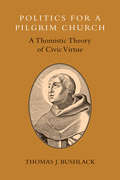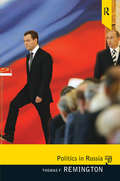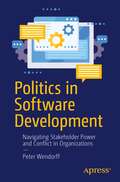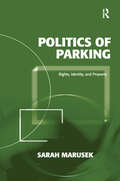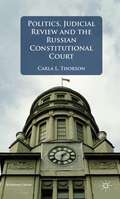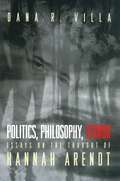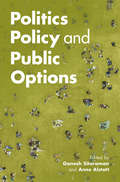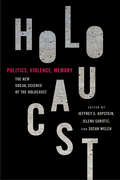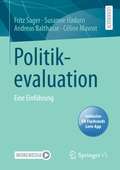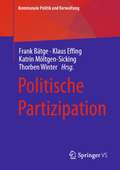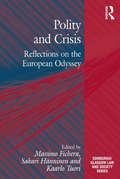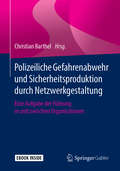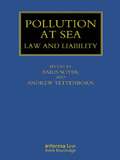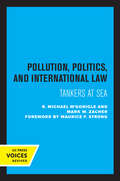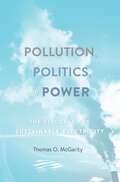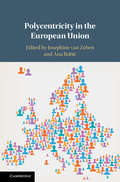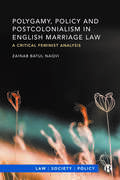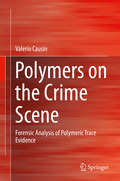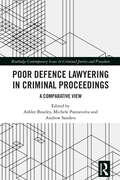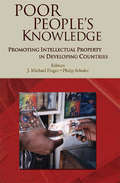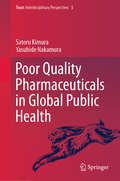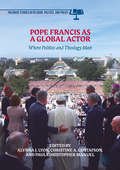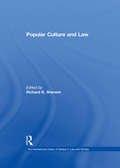- Table View
- List View
Politics for a Pilgrim Church: A Thomistic Theory of Civic Virtue
by Thomas J. BushlackPresents an innovative, constructive alternative to Christian involvement in the "culture wars" Church leaders and scholars have long wrestled with what should provide a guiding vision for Christian engagement in culture and politics. In this book Thomas Bushlack argues that a retrieval of Thomas Aquinas's understanding of civic virtue provides important resources for guiding this engagement today. Bushlack suggests that Aquinas's vision of the pilgrim church provides a fitting model for seeking the earthly common good of the political community, and he notes the features of a Thomistic account of justice and civic virtue that remain particularly salient for the twenty-first century. The book concludes with suggestions for cultivating a Christian rhetoric of the common good as an alternative to the predominant forms of discourse fostered within the culture wars that have been so divisive.
Politics in Russia
by Thomas F RemingtonHighly regarded for its comprehensive coverage, up-to-date scholarship, and comparative framework, Politics in Russia is an authoritative overview of Russia's contemporary political system and its recent evolution.Area specialist Thomas Remington focuses on four areas of change in this text state structure, regime change, economic transformation, and identity to offer a dynamic context for analyzing the post-Soviet era. With a consistent emphasis on the intersection of politics and economics and the tension between authoritarian and democratic trends, no other text guides students through the complexities and ambiguities of Russian politics today like Politics in Russia.
Politics in Software Development: Navigating Stakeholder Power and Conflict in Organizations
by Peter WendorffEquip yourself to navigate organizational politics in the world of software development. This book will help you understand the power dynamics at work between competing stakeholders with conflicting goals in projects and organizations. Politics in Software Development consists of three main parts. Author Peter Wendorff begins by defining key concepts in organizational politics. He then moves on to software development processes and investigates how their design reflects stakeholder interests. In the final part, he highlights the role of political skill in software development and provides an overview of tactics that stakeholders frequently use. There is widespread competition within organizations for rewards, recognition, status, and power. It gives rise to political behavior of stakeholders, which is generally seen as a problem. This negative view of organizational politics tends to overlook its positive functions. For example, it can also be thought of as an arena where stakeholders with conflicting goals can argue, persuade, negotiate, bargain, and cooperate to address conflicts. Political conflict resolution regularly happens in organizations in an entirely civilized manner. It helps find agreements that reconcile differences in a constructive way, and it is needed because stakeholder conflicts are simply a natural aspect of organizations. While there is much literature about organizational politics, very few authors consider the specifics of software development. This book addresses both subjects and is written for an audience interested in a political perspective on software development. What You'll LearnRecognize and understand political activities in organizationsUnderstand what software processes have to do with stakeholder power and interestsAcquire fundamental political skills for dealing with politics in software development Who This Book Is For Project managers, lead developers, team leaders, team coaches, product owners, business analysts, developers, and other software professionals. This book is also suitable for students in software engineering.
Politics of Parking: Rights, Identity, and Property
by Sarah MarusekThere is more to parking law than just parking penalties. Considering the ways in which law works in everyday life, and in familiar places of common experience where the presence of law is not obvious, this book explores the various notions of the right to park, which jurisprudentially is enacted between individuals in everyday parking. From parking areas to the courtroom, parking engenders disputes over equality, speech, legitimacy, and entitlement that reach beyond the stated scope of policy. Looking beyond the obvious, this book examines the contested site of the parking space as a place of socio-legal meaning where property claims and rights shape identities. Adopting a constitutive approach to the study of law, the book examines how regulation of parking policy is at odds with the force of localised politics, producing competing notions of legality and examples of legal semiotics within the terrain of legal geography.
Politics, Judicial Review, and the Russian Constitutional Court
by Carla L. ThorsonAnalysis of why politicians are driven to create an independent judicial institution with the authority to overrule their decisions. It focuses on a country with no tradition of independent judicial review - Russia. History does not support an independent judiciary here; yet a potentially powerful constitutional court has existed for 20 years.
Politics, Philosophy, Terror: Essays on the Thought of Hannah Arendt
by Dana VillaHannah Arendt's rich and varied political thought is more influential today than ever before, due in part to the collapse of communism and the need for ideas that move beyond the old ideologies of the Cold War. As Dana Villa shows, however, Arendt's thought is often poorly understood, both because of its complexity and because her fame has made it easy for critics to write about what she is reputed to have said rather than what she actually wrote. Villa sets out to change that here, explaining clearly, carefully, and forcefully Arendt's major contributions to our understanding of politics, modernity, and the nature of political evil in our century. Villa begins by focusing on some of the most controversial aspects of Arendt's political thought. He shows that Arendt's famous idea of the banality of evil--inspired by the trial of Adolf Eichmann--does not, as some have maintained, lessen the guilt of war criminals by suggesting that they are mere cogs in a bureaucratic machine. He examines what she meant when she wrote that terror was the essence of totalitarianism, explaining that she believed Nazi and Soviet terror served above all to reinforce the totalitarian idea that humans are expendable units, subordinate to the all-determining laws of Nature or History. Villa clarifies the personal and philosophical relationship between Arendt and Heidegger, showing how her work drew on his thought while providing a firm repudiation of Heidegger's political idiocy under the Nazis. Less controversially, but as importantly, Villa also engages with Arendt's ideas about the relationship between political thought and political action. He explores her views about the roles of theatricality, philosophical reflection, and public-spiritedness in political life. And he explores what relationship, if any, Arendt saw between totalitarianism and the "great tradition" of Western political thought. Throughout, Villa shows how Arendt's ideas illuminate contemporary debates about the nature of modernity and democracy and how they deepen our understanding of philosophers ranging from Socrates and Plato to Habermas and Leo Strauss. Direct, lucid, and powerfully argued, this is a much-needed analysis of the central ideas of one of the most influential political theorists of the twentieth century.
Politics, Policy, and Public Options
by Anne Alstott Ganesh SitaramanA public option is a government-provided social good that exists alongside a similar privately provided good. While the public option is typically identified with health care policy, public options have been a longstanding feature of American life in a variety of sectors, ranging from libraries to swimming pools. Public schools, for example, coexist alongside private schools. However, there is surprisingly little research on 'public options' as a general category. Rather, over the last few decades, considerable scholarly and popular efforts to ensure access to important social goods have focused on market subsidies (like vouchers) or privatization – which both face increasing criticism. Uniting scholars from across disciplines, this volume delves into the theory of the public option, explores several important case studies, and shows how public options could be a corrective to the trend toward privatization and subsidies. This title is also available as Open Access on Cambridge Core.
Politics, Violence, Memory: The New Social Science of the Holocaust
by Susan Welch Jeffrey S. Kopstein Jelena SubotićPolitics, Violence, Memory highlights important new social scientific research on the Holocaust and initiates the integration of the Holocaust into mainstream social scientific research in a way that will be useful both for social scientists and historians. Until recently social scientists largely ignored the Holocaust despite the centrality of these tragic events to many of their own concepts and theories. In Politics, Violence, Memory the editors bring together contributions to understanding the Holocaust from a variety of disciplines, including political science, sociology, demography, and public health. The chapters examine the sources and measurement of antisemitism; explanations for collaboration, rescue, and survival; competing accounts of neighbor-on-neighbor violence; and the legacies of the Holocaust in contemporary Europe. Politics, Violence, Memory brings new data to bear on these important concerns and shows how older data can be deployed in new ways to understand the "index case" of violence in the modern world.
Politikevaluation: Eine Einführung
by Fritz Sager Céline Mavrot Susanne Hadorn Andreas BalthasarDieses Lehrbuch führt in die Grundlagen der Politikevaluation ein. Es zeigt deren Begrifflichkeiten, Entstehung, Theorien und die heute gültigen Konzepte sowie die empirischen Methoden für die Wirkungsanalyse öffentlicher Politik. Die Einführung ist didaktisch ausgerichtet und anwendungsorientiert mit realen Beispielen und praxisnahen Aufgaben und Lösungen versehen. Das Buch richtet sich an Studierende an höheren Bildungsinstitutionen, welche die Grundlagen der Evaluation kennenlernen möchten. Ebenso dient das Buch aber auch Akteur*innen, die sich mit der Aufgabe konfrontiert sehen, Evaluationen in einem politischen Kontext in Auftrag zu geben, zu erstellen, zu beurteilen oder zu nutzen. Dies betrifft die öffentliche Verwaltung, Nicht-Regierungsorganisationen, Verbände, sowie Mitglieder der Legislative und der Exekutive, die Policy-Entscheidungen treffen. Zusätzliche Fragen per App: Laden Sie die Springer Nature Flashcards-App kostenlos herunter und nutzen Sie exklusives Zusatzmaterial, um Ihr Wissen zu prüfen.
Politische Partizipation (Kommunale Politik und Verwaltung)
by Katrin Möltgen-Sicking Thorben Winter Frank Bätge Klaus EffingDieser Sammelband gibt einen Überblick über aktuelle Formen und Formate politischer Partizipation auf kommunaler Ebene, auf Quartiersebene sowie im Bereich von Parteien, Verbänden und Hochschulen. Neben wissenschaftlichen Grundlagen der politischen Beteiligung werden konkrete Beispiele aus der Praxis beschrieben. Hinterfragt werden zudem die Bedeutung und die Folgen für die Beschäftigten der öffentlichen Verwaltung, für die Verwaltungsorganisation und die Politik.
Polity and Crisis: Reflections on the European Odyssey (Critical Studies in Jurisprudence)
by Sakari Hänninen Massimo FicheraEuropean integration is an open-ended, ongoing process which has been deeply challenged by integral world capitalism. This study explores the present EU foundational dilemma, looking at the problematic relationship between the ideal model of integration and the reality of the 21st century. Including contributions from leading theorists, this volume explores the ways and extent to which the present European crisis could create a politico-legal space for new possibilities and opportunities for action. The authors discuss the current role of the EU, and whether it aspires to be a democratic polity or a functional organization based on inter-governmental bargaining. The chapters question whether the future of European integration after the crisis will be paved by decisions which conflict with its Treaty basis, and how it might come up with alternatives which would do more than echo the compulsions of the global market. Issues are analysed from a historical perspective to see what can be learnt from its past and to explore the options for the future. With contributions from prominent international legal and political scholars, the book will be of interest to academics, students and policy-makers working in these areas.
Polizei und Protest in der Bundesrepublik Deutschland (Geschichte und Ethik der Polizei und öffentlichen Verwaltung)
by Sabine MeckingDie Polizei als Vertreterin des staatlichen Gewaltmonopols gilt als Garantin für die öffentliche Sicherheit und Ordnung im Inneren eines Staates. Von jeher gehört damit das staatliche Protest-Management zu den zentralen Aufgaben der Polizei. Die Art und Weise, wie die Polizei hierbei vorgeht und der Bevölkerung gegenübertritt, gibt Einblicke in den inneren Zustand der Gesellschaft, die politische Verfasstheit und die Herrschaftsordnung des Landes. Der Blick auf die 70-jährige Geschichte der Bundesrepublik offenbart, dass sich sowohl die Inhalte und Formen des öffentlichen Protests als auch der polizeiliche Umgang damit mehrfach verändert haben. Polizeiliche und gesellschaftliche Entwicklungen, obgleich aufeinander bezogen, verlaufen dabei jedoch nicht selten versetzt und in unterschiedlichen Geschwindigkeiten.Prof. Dr. Sabine Mecking lehrt Landes- und Zeitgeschichte an der Philipps-Universität Marburg.
Polizeiliche Gefahrenabwehr und Sicherheitsproduktion durch Netzwerkgestaltung: Eine Aufgabe Der Führung In Und Zwischen Organisationen
by Christian BarthelAlle Organisationen im Politikfeld Innere Sicherheit – Polizei, Feuerwehr, Rettungsdienste sowie Organisationen der öffentlichen Verwaltung mit sicherheitsrelevanten Aufgaben – sehen sich heute vor die Herausforderung gestellt, Sicherheit in Kooperation mit anderen Akteuren zu gewährleisten. Die aktuelle Bedrohungslage durch Terror, die Verletzlichkeit zentraler öffentlicher Infrastrukturen und des gesellschaftlichen Zusammenlebens bedarf einer systematischen Netzwerkorientierung der Sicherheitsakteure, die traditionelle Formen der Zuständigkeitsorientierung und des Nebeneinanderagierens der Sicherheitsakteure verabschiedet.Das Herausgeberwerk betrachtet die Perspektive der konkreten Netzwerkarbeit im Spannungsfeld zwischen (interorganisationalen) Einfluss- und Machtbestrebungen einerseits und professioneller Handlungsfähigkeit der Akteure andererseits und beleuchtet, wie die Rückwirkungen auf die jeweiligen Organisationen sich im Sinne des „institutional learning“ darstellen. Dabei steht die Rolle der Führungskräfte auf der mittleren Managementebene insbesondere der Polizei im Fokus der Beiträge. Die Autoren gehen u. a. auf folgende Fragen ein: Wie initiieren und managen Führungskräfte Kooperationen in der regionalen Sicherheitsproduktion? Welche professionellen Kompetenzen sind hierzu notwendig? Welche Angebote seitens polizeilicher Führungs- und Managementkonzepte sind für diese Fragestellung von Nutzen?
Pollution at Sea: Law and Liability (Maritime and Transport Law Library)
by Professor Bariş Soyer Professor Andrew TettenbornA sharp, informed and thoroughly practical guide to contemporary and developing issues relating to sea pollution, prepared by leading academics and practitioners with everyday hands-on experience. Pollution at Sea focuses on a number of the vital private law issues – compensation, insurance, contract and tort – thrown up by contemporary developments in the law of pollution. The book also intends to offer a critical analysis on emerging public law concepts, such as the legal position of seafarers from the perspective of criminal law in cases of pollution and the impact of port state control as a pollution control mechanism. Pollution at Sea is divided into three parts: 1. Private Law Liability Regimes2. Rights and Liabilities of Particular Parties3. The Impact of Public Law on the Actors Concerned In part 1; various liability regimes are dissected, including those which have been under the spotlight in recent years. This section has particular international appeal, and many of the regimes discussed are based at least in part on international conventions, agreements or practices. In part 2; the impact of pollution at sea on third parties is considered, with respect to the legal position of parties that might be perused either by the victims of pollution incidents or in some cases by the parties liable by way of a recourse action. Finally in part 3; recent relevant developments, particularly in the realm of public law are covered.
Pollution, Politics, and International Law: Tankers at Sea
by R. Michael M’Gonigle Mark W. ZacherThis title is part of UC Press's Voices Revived program, which commemorates University of California Press’s mission to seek out and cultivate the brightest minds and give them voice, reach, and impact. Drawing on a backlist dating to 1893, Voices Revived makes high-quality, peer-reviewed scholarship accessible once again using print-on-demand technology. This title was originally published in 1979.
Pollution, Politics, and Power: The Struggle for Sustainable Electricity
by Thomas O. McGarityToday’s electric power companies compete to provide cleaner electricity. That’s a good thing, but progress has come with costs, especially for communities reliant on the coal industry. Thomas McGarity examines the changes of recent decades and offers ideas for building a more sustainable grid while easing the economic downsides of coal’s demise.
Polycentricity in the European Union
by Josephine Van Zeben Ana BobićSupranational governance is being challenged by politicians and citizens around the EU as over-centralized and undemocratic. This book is premised on the idea that polycentric governance, developed by Vincent and Elinor Ostrom, is a fruitful place to start for addressing this challenge. Assessing the presence of, and potential for, polycentric governance within the EU means approaching established principles and practices from a new perspective. While the debate on these issues is rich, longstanding and interdisciplinary, it has proven difficult to sidestep the 'renationalisation/federalisation' dichotomy. The aim of this volume is not to reject the EU's institutional structure but provide a different benchmark for the assessment of its functioning. Polycentric theory highlights the importance of multilevel horizontal relationships within the EU - between states, but also between many sub-state actors, all the way down to individuals. This helps us answer the question: how do we achieve self-governance in an interdependent world?
Polygamy, Policy and Postcolonialism in English Marriage Law: A Critical Feminist Analysis (Law, Society, Policy)
by Zainab NaqviSlaves, mistresses, concubines – the English courts have used these terms to describe polygamous wives in the past, but are they still seen this way today? Using a critical postcolonial feminist lens, this book provides a contextualized exploration of English legal responses to polygamy. Through the legacies of British imperialism, the book shows how attitudes to polygamy are shaped by indifference and hostility towards its participants. This goes beyond the law, as shown by the stories of women shared throughout the book negotiating their identities and relationships in the UK today. Through its analysis, the book demonstrates how polygamy and polygamous wives are subjected to imperialist and orientalist discourses which dehumanise them for practising a relationship that has existed for millennia.
Polymers on the Crime Scene
by Valerio CausinThis book approaches the analysis of forensic contact traces from a polymer science perspective. The development of characterization methods of new or unusual traces and the improvement of existing protocols is described. The book starts with a general introduction to polymers and the issues related to transfer, persistence and recovery of polymeric traces. The chapters present a distinctive feature of polymers, discussing how it can be measured, what the practical difficulties which can be encountered in the analysis, and how useful that information is for comparison or identification purposes. Practical tips for the realization of the forensic analyses are included.
Ponzi Schemes in the Caribbean
by Catherine Pattillo Ana Carvajal Hunter Monroe Brian WynterA report from the International Monetary Fund.
Poor Defence Lawyering in Criminal Proceedings: A Comparative View (Routledge Contemporary Issues in Criminal Justice and Procedure)
by Andrew Sanders Ashlee Beazley Michele PanzavoltaThis collection discusses the concept of ‘poor quality’ criminal defence representation and assistance, so-termed poor lawyering. It does so from diverse perspectives, including legal and criminological. The work presents an overview of the issue of the quality of legal assistance in criminal proceedings, so allowing a better understanding of the potential limits and problems. The volume is divided into three parts which, over 14 chapters, offer analyses of poor lawyering across national and supranational legal systems, including Belgium, Germany, Greece, Italy, England and Wales, the United States, and the European Court of Human Rights; the specific challenges of poor lawyering, such as regulation of counsel before the International Criminal Court, through codes of conduct, and in cross-border proceedings within Europe; the individual fault and external pressures of criminal defence lawyers; the ‘missed opportunity’ of pre-charge engagement; the importance of insights from legal and criminological psychology; and the role of neurodivergent defendants in the adaptation of the defence lawyer’s assistance. The collection concludes with a transversal and comparative analysis of the effectiveness of defence and the independence of lawyers. With contributions from academics and practitioners from a range of backgrounds, the book will be a valuable resource for students, academics, researchers, and policymakers working in the area of criminal justice.
Poor People's Knowledge: Promoting Intellectual Property in Developing Countries
by J. Michael Finger Philip SchulerHow can we help poor people earn more from their knowledge-rather than from their sweat and muscle alone? This book is about increasing the earnings of poor people in poor countries from their innovation, knowledge, and creative skills. Case studies look at the African music industry; traditional crafts and ways to prevent counterfeit crafts designs; the activities of fair trade organizations; biopiracy and the commercialization of ethnobotanical knowledge; the use of intellectual property laws and other tools to protect traditional knowledge. The contributors' motivation is sometimes to maintain the art and culture of poor people, but they recognize that except in a museum setting, no traditional skill can live on unless it has a viable market. Culture and commerce more often complement than conflict in the cases reviewed here. The book calls attention to the unwritten half of the World Trade Organization's Agreement on the Trade Related Aspects of Intellectual Property (TRIPS). TRIPS is about knowledge that industrial countries own, and which poor people buy. This book is about knowledge that poor people in poor countries generate and have to sell. It will be of interest to students and scholars of international trade and law, and to anyone with an interest in ways developing countries can find markets for cultural, intellectual, and traditional knowledge.
Poor Quality Pharmaceuticals in Global Public Health (Trust #5)
by Satoru Kimura Yasuhide NakamuraThis book aims to clarify the global aspects of poor quality pharmaceuticals, generic products in particular, becoming complicated through the process of IMPACT (International Medical Products Anti-Counterfeiting Taskforce) organized by the initiative of the World Health Organization (WHO) in 2006. The findings from this book provide a long-term perspective to policymakers. This book discusses from the following points: industrial standardization, healthcare market accessibility, motivation on supply side, WHO medicines policy and intellectual property rights. Standardization regulates the quality and enabled the generic medicines spreading to developing/emerging countries through technology transfer. However, quality is a part of cost and reflected to price. When a healthcare service market is divided according to wealth gap, compliance to standardization for quality on supply side is divided accordingly. Thus, poor quality pharmaceuticals are prevalent worldwide. Generic pharmaceuticals are essential resources in public health. The WHO has been involved in the dispute around the intellectual property rights under its intention to promote the new drug development for neglected diseases. Global pandemic of AIDs is a critical factor to accelerate the confusion. This created feelings of distrust among developing/emerging countries against developed countries if the WHO was in favour of developed countries. In addition to that, an easy and optimistic start of IMPACT stirred up conflicts of interests in the international community. The problem of poor quality pharmaceuticals became more complicated through the conflicts on intellectual property rights; patented drugs to generic drugs. A key for quality generic products is the formation of a single healthcare service market where good motivation on supply side together with fair competitiveness with patented pharmaceuticals and equitable access to services (both for the rich and the poor) are ensured. Political commitment to investment and regulatory infrastructure for the market is crucial.
Pope Francis as a Global Actor: Where Politics And Theology Meet (Palgrave Studies in Religion, Politics, and Policy)
by Alynna J. Lyon Christine A. Gustafson Paul Christopher ManuelPope Francis confuses many observers because his papacy does not fit neatly into any pre-established classificatory schemes. To gain a deeper appreciation of Francis’s complicated papacy, this volume proposes that an interdisciplinary approach, fusing concepts derived from moral theology and the social sciences, may properly situate Pope Francis as a global political entrepreneur. The chapters in this volume ask what difference it makes that he is the first pope from Latin America, how and why different countries in the world respond to him, how his understanding of scripture informs his ideas on economic, social, and environmental policy, and where politics meets theology under Francis. In the end, this volume seeks to provide a more robust understanding of the enigmatic papacy of Francis.
Popular Culture and Law: The Vanishing Line Between Law And Popular Culture (The\international Library Of Essays In Law And Society Ser.)
by Richard K. SherwinWhat are the consequences when law's stories and images migrate from the courtroom to the court of public opinion and from movie, television and computer screens back to electronic monitors inside the courtroom itself? What happens when lawyers and public relations experts market notorious legal cases and controversial policy issues as if they were just another commodity? What is the appropriate relationship between law and digital culture in virtual worlds on the Internet? In addressing these cutting edge issues, the essays in this volume shed new light on the current status and future fate of law, truth and justice in our time.
